Related Research Articles
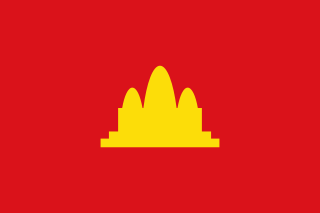
The Khmer Rouge is the name that was popularly given to members of the Communist Party of Kampuchea (CPK), and by extension to Democratic Kampuchea, which ruled Cambodia between 1975 and 1979. The name was coined in the 1960s by Norodom Sihanouk to describe his country's heterogeneous, communist-led dissidents, with whom he allied after the 1970 Cambodian coup d'état.

Norodom Sihanouk was a member of the Cambodian royal house who led the country as King and Prime Minister. In Cambodia, he is known as Samdech Euv. During his lifetime, Cambodia was under various regimes, from French colonial rule, a Japanese puppet state (1945), an independent kingdom (1953–1970), a military republic (1970–1975), the Khmer Rouge regime (1975–1979), a Vietnamese-backed communist regime (1979–1989), a transitional communist regime (1989–1993) to eventually another kingdom.

The Khmer Republic was a Cambodian state under the United States-backed military dictatorship of Marshal Lon Nol from 1970 to 1975. Its establishment was formally declared on 9 October 1970, following the 18 March 1970 coup d'état which saw the overthrow of Norodom Sihanouk's government and the abolition of the Cambodian monarchy.

Cambodia, officially the Kingdom of Cambodia, is a country in Southeast Asia on the Indochinese Peninsula. It is bordered by Thailand to the northwest, Laos to the north, and Vietnam to the east, and has a coastline along the Gulf of Thailand in the southwest. It spans an area of 181,035 square kilometres, dominated by a low-lying plain and the confluence of the Mekong river and Tonlé Sap, Southeast Asia's largest lake. It is dominated by a tropical climate and is rich in wildlife and biodiversity. Cambodia has a population of about 17 million people, the majority of which are ethnically Khmer. Its capital and most populous city is Phnom Penh, followed by Siem Reap and Battambang.

After decades of conflict, Cambodia's modern era began in 1993 with the restoration of the monarchy and end of the United Nations Transitional Authority after general elections were held. Since 1993, the Cambodian People's Party have consistently been in government, and consolidated power in a 1997 coup d'état. Hun Sen was prime minister until transfer of power to his son, Hun Manet, in 2023.

Samdech Hun Sen is a Cambodian politician, and former army general who currently serves as the president of the Senate. He previously served as the prime minister of Cambodia from 1985 to 1993 and from 1998 to 2023. Hun Sen is the longest-serving head of government in Cambodia's history. He is the president of the Cambodian People's Party (CPP), which has governed Cambodia since 1979, and has served as a member of the Senate since 2024. His full honorary title is Samdech Akka Moha Sena Padei Techo Hun Sen.
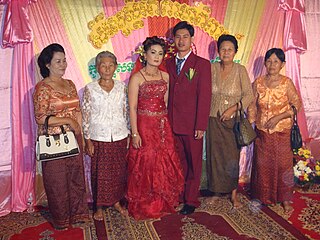
Chinese Cambodians are Cambodian citizens of Chinese ancestry or Chinese of full or partial Khmer ancestry. The Khmer term Khmer Kat Chen (ខ្មែរកាត់ចិន) is used for people of mixed Chinese and Khmer descent; Chen Khmer (ចិនខ្មែរ) means Cambodian-born citizen with ancestry from China. The Khmer constitute the largest ethnic group in Cambodia among whom Chen means "Chinese". Contact with the Chinese people such as envoys, merchants, travelers and diplomats who regularly visited Indochina verifiably existed since the beginning of the common era. However, the earliest record of a Chinese community in Cambodia dates to the 13th century.
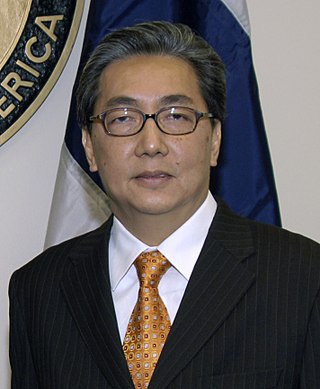
Somkid Jatusripitak is a Thai economist, business theorist, and politician.

Yang Chuantang is a Chinese politician who served as the Minister of Transport of the People's Republic of China from 2012 to 2016. He has also served as the vice chairman of the State Ethnic Affairs Commission, governor of Qinghai Province, party chief of the Tibet Autonomous Region, and one of the vice chairmen of the 9th Chinese People's Political Consultative Conference.
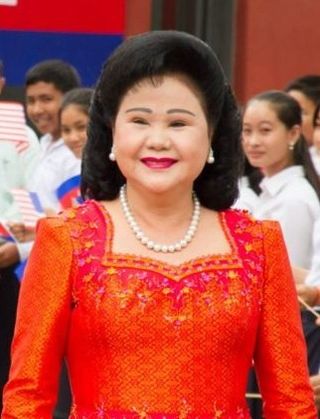
Bun Rany is the spouse of the former prime minister of Cambodia Hun Sen. She also served as the vice president of the National Association of the Cambodian Red Cross and, since 1998, as its president. She has received national and international recognition and numerous awards for her work and endeavor with Cambodia's orphans and poor, HIV/AIDS awareness and prevention, and her emphasis on women's issues with efforts to improve domestic safety and empowerment through education and vocational training. Her full honorary title is Samdech Kittipritbandit Bun Rany Hun Sen.

Jieyang Chaoshan International Airport is an international airport serving the cities of Jieyang, Shantou and Chaozhou in South Central China‘s Guangdong province. It is located in the towns of Paotai and Denggang in Jiedong District, Jieyang, Guangdong. It was part of a relocation plan from the original Shantou Waisha Airport, and the site was chosen to be near the geographic center of Jieyang, Shantou, and Chaozhou. The airport was put into service on 15 December 2011, with the simultaneous shut-down of Shantou Waisha Airport as a commercial airport.
Hong Sun Huot was the Cambodian Minister of Health and Chairman of the National AIDS Authority, as well as a Senior Minister. He belongs to Funcinpec and was elected to represent Kandal Province in the National Assembly of Cambodia in 2003. Hong is a third generation Chinese-Cambodian, with ancestral roots hailing from Chaozhou. His Chinese Family is 杨 (Yang).
Kuoch Ky is a Cambodian politician. He belongs to Funcinpec, a royalist political party, and was elected to represent Prey Veng Province in the National Assembly of Cambodia in 2003. Kuoch currently serves as the Secretary of State for Commerce and is of Chinese descent, being the son of Chinese immigrants from Jieyang. His real Chinese name: 郭基

Tea Banh is a Cambodian politician and general. He was a Deputy Prime Minister and Minister for National Defence of Cambodia from 1987 until 2023. He is a former general and a member of the Cambodian People's Party and was elected to represent Siem Reap Province in the National Assembly of Cambodia in the 2003 elections. He was succeeded as defence minister by his eldest son Tea Seiha.
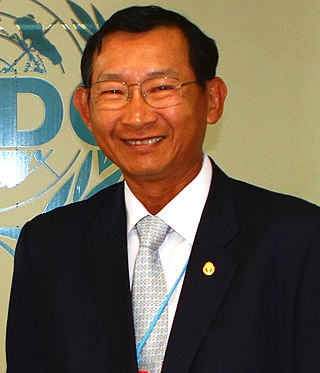
Cham Prasidh is the Cambodian former Minister of Industry, Science, Technology and Innovation. His Chinese name is 黃裕德虎. Mr Prasidh previously served as a Senior Minister and Minister of Commerce for 19 years (1994-2013). He is a member of the Cambodian People's Party and was elected to represent Siem Reap Province in the National Assembly of Cambodia in 1993, 1998, and 2003 and was elected to represent Kep Province in 2008, 2013, 2018 and 2023
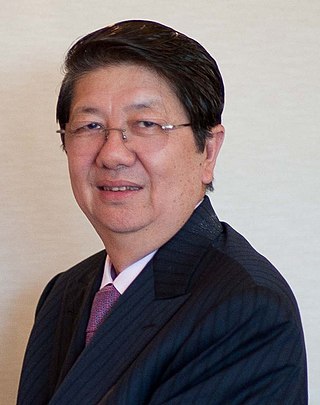
Sok An was a Cambodian academic and politician. He was a Member of Parliament (MP) for Takéo in 1993, then assumed additional roles of Deputy Prime Minister and Minister for the Office of the Council of Ministers from 2004 until his death. He was also a member of the central committee of the Cambodian People's Party.
Chan Sarun is the former Cambodian Minister of Agriculture, Forestry and Fisheries. He belongs to the Cambodian People's Party and was elected to represent Takeo Province in the National Assembly of Cambodia in 2003. The younger brother of the late Cambodian-American actor Haing S. Ngor, and also the brother-in-law of the late Chang My-Huoy, Chan is the son of an ethnic Chinese father and a Khmer mother, with ancestry from the Hakka of Meizhou.

The Communist Party of Kampuchea (CPK), also known as the Khmer Communist Party, was a communist party in Cambodia. Its leader was Pol Pot, and its members were generally known as the Khmer Rouge. Originally founded in 1951, the party was split into pro-Chinese and pro-Soviet factions as a result of the Sino–Soviet split with the former being the Pol Pot faction, and the latter adopting a more revisionist approach to Marxism. As such, it claimed that 30 September 1960 was its founding date; it was named the Workers' Party of Kampuchea before it was renamed the Communist Party in 1966.

The Cambodian genocide was the systematic persecution and killing of Cambodian citizens by the Khmer Rouge under the leadership of Prime Minister of Democratic Kampuchea, Pol Pot. It resulted in the deaths of 1.5 to 2 million people from 1975 to 1979, nearly 25% of Cambodia's population in 1975.
References
- ↑ 杨来盛个人资料大全-简历 图片 文章-潮汕人物辞条 Archived 2008-11-20 at the Wayback Machine , 2008-7-12, 潮汕风情网整理
- ↑ "Ministry of Rural Development". Archived from the original on 2009-01-07. Retrieved 2008-07-26.
- ↑ "Election results" Archived 2008-06-16 at the Wayback Machine . Cambodia National Election Committee. Accessed June 18, 2008.
- ↑ 抓先進性教育 促僑聯事業發展, 2005-3-30, 揭陽市僑聯
- ↑ 柬埔寨华人
- ↑ 柬埔寨华人为发展中柬友谊作出贡献 [ permanent dead link ]
- ↑ 柬埔寨華人系列(一), 2001-03-23, 蔡振裕